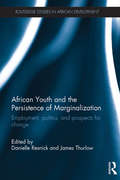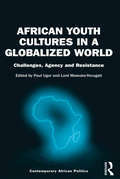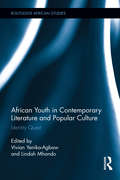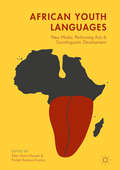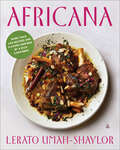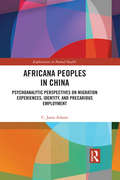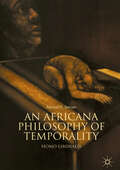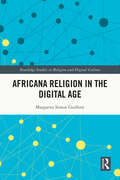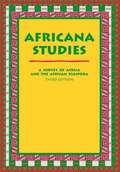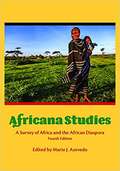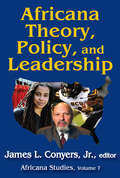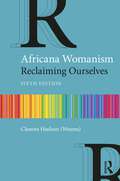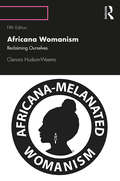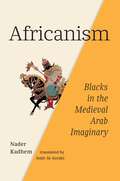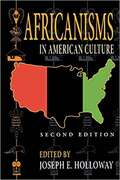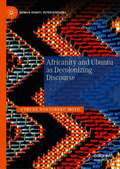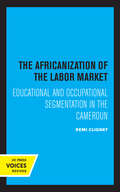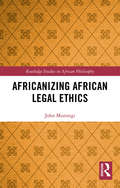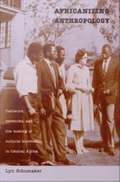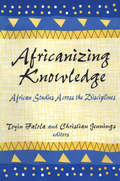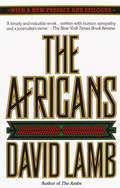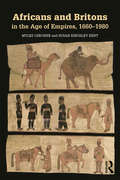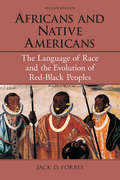- Table View
- List View
African Youth and the Persistence of Marginalization: Employment, politics, and prospects for change (Routledge Studies in African Development)
by Danielle Resnick James ThurlowThe much heralded growth and transformation of many economies in sub-Saharan Africa over the last decade continues to receive prominent attention in academic scholarship and among policy practitioners. An apparent feature about this transformation, however, is that Africa’s youth appear to have been left out. This book critically examines the extent and consequences of the marginalization of African youth. It questions conventional wisdoms about data trends, aspirational goals, and common policy interventions surrounding Africa’s youth that have been variously propagated in both the development studies literature and in mainstream donor policy reports. The book explores macro trends from both a temporal and cross-regional perspective in order to highlight what is distinct about contemporary African youth and whether their prospects and behaviours do actually vary from their counterparts in other regions of the world or from previous generations of African youth. Such studies include cross-country analyses of youth employment patterns and modes of political participation, in-depth examination of the behaviours and aspirations of the urban youth, and critical reflections on the impact of rural employment initiatives, vocational education, and learnership programmes. The incorporation of multiple methods and disciplines, as well as its attention to policy issues, ensures that the book will be of great interest to graduate students, researchers, and professional researchers whose work lies at the intersection of African area studies and development studies as well as those focused on development economics, political science, and public policy and administration.
African Youth Cultures in a Globalized World: Challenges, Agency and Resistance (Contemporary African Politics)
by Paul Ugor Lord Mawuko-YevugahAll over the world, there is growing concern about the ramifications of globalization, late-modernity and general global social and economic restructuring on the lives and futures of young people. Bringing together a wide body of research to reflect on youth responses to social change in Africa, this volume shows that while young people in the region face extraordinary social challenges in their everyday lives, they also continue to devise unique ways to reinvent their difficult circumstances and prosper in the midst of seismic global and local social changes. Contributors from Africa and around the world cover a wide range of topics on African youth cultures, exploring the lives of young people not necessarily as victims, but as active social players in the face of a shifting, late-modernist civilization. With empirical cases and varied theoretical approaches, the book offers a timely scholarly contribution to debates around globalization and its implications and impacts for Africa's youth.
African Youth in Contemporary Literature and Popular Culture: Identity Quest (Routledge African Studies #13)
by Vivian Yenika-Agbaw Lindah MhandoThis book explores how African youth are depicted in contemporary literature and popular culture, and discusses the different ways by which they attempt to construct personal and cultural identities through popular culture and social media outlets. The contributors approach the subject from an interdisciplinary perspective, looking at images in children’s and adolescent literature from Africa, and the African diaspora, from Nollywood and Hollywood movies, from popular magazines, and from youth cultures encountered directly through field experiences. The findings reveal that there are many stereotypes about Africa, African youth and black cultures, and that African youth are aware of these. Since they juggle multiple identities shaped by their ethnicities, race and religion, it is often a challenge for them to define themselves. As they also share a global youth culture that transcends these cultural markers, some take advantage of media outlets to voice their concerns and participate in political struggles. Others simply use these to promote their personal interests. Contributors ponder the challenges involved in constructing unique identities, offering ideas on how African youth are doing so successfully or not in different parts of the continent and the African diaspora, and thus offer new possibilities for youth studies.
African Youth Languages: New Media, Performing Arts And Sociolinguistic Development
by Ellen Hurst-Harosh Fridah Kanana ErastusThis book showcases current research on language in new media, the performing arts and music in Africa, emphasising the role that youth play in language change and development. The authors demonstrate how the efforts of young people to throw off old colonial languages and create new local ones has become a site of language creativity. <P><P>Analysing the language of ‘new media’, including social media, print media and new media technologies, and of creative arts such as performance poetry, hip-hop and rap, they use empirical research from such diverse countries as Cameroon, Nigeria, Kenya, the Ivory Coast and South Africa. <P>This original edited collection will appeal to students and scholars of African sociolinguistics, particularly in the light of the rapidly changing globalized context in which we live.
Africana: More than 100 Recipes and Flavors Inspired by a Rich Continent
by Lerato Umah-ShaylorA culinary adventure and celebration of African cooking and cultural diversity, from a pioneering West African food writer, television personality, and cooking teacher.Food writer and cook Lerato Umah-Shaylor’s magnificent cookbook is a delicious eating tour of the African continent, introducing vibrant and varied cuisines that are rich in flavor, diverse in culture, and steeped in tradition.Lerato adds her own modern twist and inventive style to traditional African dishes that have been passed down and enjoyed for generations, and combines these recipes with personal stories of Africa infused with her delectable sense of adventure.With Africana, home cooks can learn how to create some of the most iconic African dishes, from Nigeria to Madagascar and Morocco to South Africa. Here are more than 100 recipes to delight and inspire, such as Spice Island Coconut Fish Curry, Harissa Leg of Lamb with Hibiscus, Senegalese Yassa, Tunisian Tagine, South African Malva Pudding, and the secret to the perfect Jollof.A feast for the senses, bursting with flavor, and offering a sense of wanderlust, Africana will bring the magic of the continent to any kitchen.
Africana People in China: Psychoanalytic Perspectives on Migration Experiences, Identity, and Precarious Employment (Explorations in Mental Health)
by C. Jama AdamsThis book examines the psychosocial experiences of foreign workers from Africa and its diaspora in China, within the context of international socio-economic forces. By exploring employment-based migration from a psychoanalytic perspective, this volume investigates the utility of adaptive ambivalence and the challenges that migrant workers face around issues of self-development, agency, and identity. Through a careful analysis of interviews with Africana people, the author demonstrates that the capacity to be reflective and resilient alongside having a strong and diversified support network are crucial for the psychological well-being of those living and working in unfamiliar geographic and cultural conditions.
An Africana Philosophy of Temporality: Homo Liminalis
by Michael E. SawyerThis book is a timely intervention in the areas of philosophy, history, and literature. As an exploration of the modern political order and its racial genealogy, it emerges at a moment when scholars and activists alike are wrestling with how to understand subject formation from the perspective of the subordinated rather than from dominant social and philosophical modes of thought. For Sawyer, studying the formation of racialized subjects requires a new imagining of marginalized subjects. Black subjectivity is not viewed from the static imaginings of social death, alienation, ongoing abjection, or as a confrontation with the treat of oblivion. Sawyer innovates the term "fractured temporality," conceptualizing Black subjects as moving within and across temporalities in transition, incorporated, yet excluded, marked with the social death of Atlantic slavery and the emergent political orders it etched, and still capable of exerting revolutionary force that acts upon, against, and through racial oppression.
Africana Religion in the Digital Age (Routledge Studies in Religion and Digital Culture)
by Margarita Simon GuilloryThis book diversifies the fields of digital religion studies and Africana religious studies by considering the nuanced intersections between digital technologies and the religious experiences of African Americans. While Christianity is a continuous marker of religious identity for many African Americans, this digital approach to examining Africana religion in the US uncovers other non-Christian esoteric traditions that have often been marginalized within academia. The book explores the diverse ways that African Americans employ the Internet, social media, human enhancement technologies, and gaming to construct multidimensional modes of religious identities. It also considers the ways that Africana religious practitioners employ digital platforms to both complement and disrupt religious authority. Ultimately, the book establishes Africana religious experiences as viable entry points in the scholarly engagement of religion in the digital age. As such, it will be a key resource for scholars of Religious Studies, Africana Religious and Esoteric Studies, Religion and Culture and Religion and Sociology.
Africana Studies: A Survey Of Africa And The African Diaspora
by Mario AzevedoThe third edition of Africana Studies: A Survey of Africa and the African Diaspora is an update of the second edition (1998) and incorporates new chapters that include expanded coverage of issues on women, health, terrorism, the African Union, and many others, as well as the most recent theories and methods in Africana studies. To date, Africana Studies remains the most comprehensive and most suitable text for both teachers and students interested in Africa and the Diaspora in the US, the Caribbean, Afro-Latin-America, and elsewhere. The book is divided into five parts: the state of the art of Africana studies; the evolution of the history of black people; analysis of the contributions of the black world; the present and future status of these peoples; and the societies and values of black people. The book also includes a chronology of significant events in the history of peoples of African descent and a number of maps.
Africana Studies: A Survey of Africa and the African Diaspora
by Mario Joaquim AzevedoThis fourth edition of Africana Studies: A Survey of Africa and the African Diaspora comes at an important time, as Africans on the continent and their descendants in the US and in the Caribbean and Latin America and all over the globe are attempting to free themselves from the shackles and legacy of slavery, conquest, colonialism and neo-colonialism, discrimination, and dependency, and to consolidate the gains they have made over the past centuries. Yet, in spite of all advances and the new place they occupy in world affairs, many peoples of African descent are desperately still struggling to overcome war, fear, disease, political dissention, corruption, mutual distrust, and human rights abuses. Historian and Professor Mario Azevedo and his colleagues have attempted in this volume to present aspects of the black world by exposing students, faculty, and other readers to the experiences, achievements, and aspirations of those who have long been considered to be the "Wretched of the Earth." This book covers the turbulent but also compelling themes of the lives of continental Africans and those in the Diaspora--their history, which transcends millenia; their human expressions in art and music; the uniqueness of their manifestations in literature; their efforts at eliminating disease and pestilence; their traditional religions and the interpretation of the cosmos; the state of their science, sports, and business; the plight of their most vulnerable, such as women, children, and the poor; their interaction across the continents; and the many other critical issues that affect the lives of people scattered across the globe. The fourth edition of Africana Studies is a succinct, accessible, and readable source of knowledge, written by experts, that covers the black world in-depth and with breadth. Professor Azevedo and the other contributors have created a compendium of knowledge that looks at both traditional and contemporary theories in the field of African and Diaspora Studies, while also providing a glimpse of what the future holds. --
Africana Theory, Policy, and Leadership (Africana Studies)
by Jr. ConyersAfricana Theory, Policy, and Leadership is an eclectic work that examines Africana issues from multiple angles, including literature, ethnography, gender, aesthetics, and diversity. The contributors to this volume add unique and insightful works to the collection of research and writing documenting the pan-African experience. Conyers offers the reader an interdisciplinary approach to the study of people of African descent with special emphasis on the black population of the United States.This collection addresses a wide range of topics. "Africana Literature as Social Science" reviews the scholarship of August Wilson and Suzan Lori-Parks. "How Homeland Eritrea Monitors Its American Diaspora" analyses Eritrean government-diaspora tensions. "Toward Theorizing Gender without Feminism" and "Are Black Women the New Mules of the Prison Industrial Complex?" illustrates the double burden of race and gender borne by black women. "Africana Aesthetics" documents black life in post-Civil War Texas with photos. "Africana Studies and Diversity" explores the struggle to maintain athletic programs at historically black colleges. "The Africana Idea in Leadership Studies" offers an Afrocentric approach to the study of critical theory in leadership.This volume presents examples of Africana scholarship in major areas of work, including literature, politics, feminist studies, criminology, history, and sports studies, and is the most recent volume in Transaction's Africana Studies series.
Africana Womanism: Reclaiming Ourselves
by Clenora Hudson (Weems)The sixth edition of Africana Womanism provides important updates to the classic text in which Clenora Hudson (Weems) sets out a paradigm for women of African descent. Differentiating itself from the problematic theories of Western feminisms, Africana Womanism allows an establishment of cultural identity and relationship directly to ancestry and land. Introduced in the mid-1980s, Africana Womanism offers a new term and paradigm for women of African descent, a family-centered concept, prioritizing race, class, and gender. This new edition includes an Africana Womanist reading of Angie Thomas’ twenty-first-century novel, The Hate U Give, continuing existing Africana Womanist readings of twentieth-century novels by Hurston, Bâ, Marshall, Morrison, and McMillan; a Prologue, a previously unpublished interview with the author; a revised conclusion; updated bibliographies; an updated annotated bibliography; and a new section outlining key questions, clarifications, considerations, and commentaries surrounding Africana Womanism in relation to other female-based theories. Africana Womanism remains an important work and essential reading for researchers and students in women and gender studies, Africana studies, African American studies, literary studies, and cultural studies.
Africana Womanism: Reclaiming Ourselves
by Clenora Hudson (Weems)A classic in African American Studies and Gender Studies.Sixth edition will feature a new chapter discussing Angie Thomas' The Hate You Give.Outlines a novel, non-western notion of 'womanism' rather than 'feminism'.
Africana Womanism: Reclaiming Ourselves
by Clenora Hudson-WeemsFirst published in 1993, this is a new edition of the classic text in which Clenora Hudson-Weems sets out a paradigm for women of African descent. Examining the status, struggles and experiences of the Africana woman forced into exile in Europe, Latin America, the United States or at Home in Africa, the theory outlines the experience of Africana women as unique and separate from that of some other women of color, and, of course, from white women. Differentiating itself from the problematic theories of Western feminisms, Africana Womanism allows an establishment of cultural identity and relationship directly to ancestry and land. This new edition includes five new chapters as well as an evolution of the classic Africana womanist paradigm, to that of Africana-Melanated Womanism. It shows how race, class and gender must be prioritized in the fight against every day racial dominance. Africana Womanism: Reclaiming Ourselves offers a new term and paradigm for women of African descent. A family-centered concept, prioritizing race, class and gender, it offers eighteen features of the Africana womanist (self-namer, self-definer, family-centered, genuine in sisterhood, strong, in concert with male in the liberation struggle, whole, authentic, flexible role player, respected, recognized, spiritual, male compatible, respectful of elders, adaptable, ambitious, mothering, nurturing), applying them to characters in novels by Hurston, Bâ, Marshall, Morrison and McMillan. It evolves from Africana Womanism to Africana-Melanated Womanism. This is an important work and essential reading for researchers and students in women and gender studies, Africana studies, African-American studies, literary studies and cultural studies, particularly with the emergence of family centrality (community and collective engagement), the very cornerstone of Africana Womanism since its inception.
Africanism: Blacks in the Medieval Arab Imaginary
by Nader KadhemAnti-blackness has until recently been a taboo topic within Arab society. This began to change when Nader Kadhem, a prominent Arab and Muslim thinker, published the first in-depth investigation of anti-black racism in the Arab world in 2004. This translation of the new and revised edition of Kadhem’s influential text brings the conversation to the English-speaking world.Al-Istifraq or Africanism, a term that is analogous to Orientalism, refers to the discursive elements of perceiving, imagining, and representing black people as a subject of study in Arabic writings. Kadhem explores the narratives of Africanism in the Arab imaginary from the Middle Ages to the nineteenth century to show how racism toward black people is ingrained in the Arab world, offering a comprehensive account of the representations of blackness and black people in Arab cultural narratives – including the Quran, the hadith, and Arabic literature, geography, and history. The book examines the pejorative image of black people in Arab cultural discourse through three perspectives: the controversial anthropological concept that culture defines what it means to be human; the biblical narrative of Noah cursing his son Ham’s descendants – understood to be darker-skinned – with servitude; and Greco-Roman physiognomy, philosophy, medicine, and geography. Describing the shifting standards of inclusion that have positioned Arab identity in opposition to blackness, Kadhem argues that in the cultural imaginary of the Arab world, black people are widely conflated with the Other.Analyzing canonical Arabic texts through the lens of English, French, and German theory, Africanism traces the history of racism in Arab culture.
Africanisms In American Culture, Second Edition
by Joseph E. Holloway Margaret Washington Selase W. Williams Molefi Kete Asante George Brandon Robert L. Hall Jessie Ruth Gaston Portia K. Maultsby John Edwards Philip Robert Farris ThomsonAn important work in the field of diaspora studies for the past decade, this collection has inspired scholars and others to explore a trail blazed originally by Melville J. Herskovits, the father of New World African studies. Since its original publication, the field has changed considerably. Africanism has been explored in its broader dimensions, particularly in the area of white Africanisms. Thus, the new edition has been revised and expanded. Joseph E. Holloway has written three essays for the new volume. The first uses a transnational framework to examine how African cultural survivals have changed over time and readapted to diasporic conditions while experiencing slavery, forced labor, and racial discrimination. The second essay is "Africanisms in African American Names in the United States." The third reconstructs Gullah history, citing numerous Africanisms not previously identified by others. In addition, "The African Heritage of White America" by John Phillips has been revised to take note of many more instances of African cultural survivals in white America and to present a new synthesis of approaches.
Africanity and Ubuntu as Decolonizing Discourse (Human Rights Interventions)
by Otrude Nontobeko MoyoThis book explores and discusses emerging perspectives of Ubuntu from the vantage point of “ordinary” people and connects it to human rights and decolonizing discourses. It engages a decolonizing perspective in writing about Ubuntu as an indigenous concept. The fore grounding argument is that one’s positionality speaks to particular interests that may continue to sustain oppressions instead of confronting and dismantling them. Therefore, a decolonial approach to writing indigenous experiences begins with transparency about the researcher’s own positionality. The emerging perspectives of this volume are contextual, highlighting the need for a critical reading for emerging, transformative and alternative visions in human relations and social structures.
The Africanization of the Labor Market: Educational and Occupational Segmentations in the Cameroun
by Remi ClignetThis title is part of UC Press's Voices Revived program, which commemorates University of California Press’s mission to seek out and cultivate the brightest minds and give them voice, reach, and impact. Drawing on a backlist dating to 1893, Voices Revived makes high-quality, peer-reviewed scholarship accessible once again using print-on-demand technology. This title was originally published in 1976.
Africanizing African Legal Ethics (Routledge Studies in African Philosophy)
by John MurungiThis book is a philosophical inquiry into indigenous African legal ethics, asking what is African about African legal ethics? Taking us beyond a geographical understanding of Africa, the author argues for an African legal ethics that is distinct from non-African African legal ethics which are rooted in Euro-Western constructions. De-silencing African voices on African legal ethics this book decolonizes the prevailing wisdom on legal ethics and broadens our understanding of how law in Africa bears on ethics in Africa or, conversely, on how ethics bears on law in Africa. This book will be of interest to scholars of African philosophy, philosophy of law, and legal ethics.
Africanizing Anthropology: Fieldwork, Networks, and the Making of Cultural Knowledge in Central Africa
by Lyn SchumakerAfricanizing Anthropology tells the story of the anthropological fieldwork centered at the Rhodes-Livingstone Institute in Northern Rhodesia (now Zambia) during the mid-twentieth century. Focusing on collaborative processes rather than on the activity of individual researchers, Lyn Schumaker gives the assistants and informants of anthropologists a central role in the making of anthropological knowledge. Schumaker shows how local conditions and local ideas about culture and history, as well as previous experience of outsiders' interest, shape local people's responses to anthropological fieldwork and help them, in turn, to influence the construction of knowledge about their societies and lives. Bringing to the fore a wide range of actors--missionaries, administrators, settlers, the families of anthropologists--Schumaker emphasizes the daily practices of researchers, demonstrating how these are as centrally implicated in the making of anthropological knowlege as the discipline's methods. Selecting a prominent group of anthropologists--The Manchester School--she reveals how they achieved the advances in theory and method that made them famous in the 1950s and 1960s. This book makes important contributions to anthropology, African history, and the history of science.
Africanizing Knowledge: African Studies Across the Disciplines
by Toyin FalolaNearly four decades ago, Terence Ranger questioned to what extent African history was actually African, and whether methods and concerns derived from Western historiography were really sufficient tools for researching and narrating African history. Despite a blossoming and branching out of Africanist scholarship in the last twenty years, that question is still haunting. The most prestigious locations for production of African studies are outside Africa itself, and scholars still seek a solution to this paradox. They agree that the ideal solution would be a flowering of institutions of higher learning within Africa which would draw not only Africanist scholars, but also financial resources to the continent.While the focus of this volume is on historical knowledge, the effort to make African scholarship "more African" is fundamentally interdisciplinary. The essays in this volume employ several innovative methods in an effort to study Africa on its own terms. The book is divided into four parts. Part 1, "Africanizing African History," offers several diverse methods for bringing distinctly African modes of historical discourse to the foreground in academic historical research. Part 2, "African Creative Expression in Context," presents case studies of African art, literature, music, and poetry. It attempts to strip away the exotic or primitivist aura such topics often accumulate when presented in a foreign setting in order to illuminate the social, historical, and aesthetic contexts in which these works of art were originally produced. Part 3, "Writing about Colonialism," demonstrates that the study of imperialism in Africa remains a springboard for innovative work, which takes familiar ideas about Africa and considers them within new contexts. Part 4, "Scholars and Their Work," critically examines the process of African studies itself, including the roles of scholars in the production of knowledge about Africa.This timely and thoughtful volume will be of interest to African studies scholars and students who are concerned about the ways in which Africanist scholarship might become "more African."
Africans
by John IliffeThis is a history of Africa from the origins of mankind right up to the South African general election of 1994. Africans have been pioneers struggling against disease and nature in an overwhelmingly hostile environment, and their social, economic and political institutions have been designed to ensure survival and maximise numbers. These institutions enabled them to survive the slave trade and colonial invasion, but in the context of medical progress and other twentieth-century innovations the same institutions have bred the most rapid population growth the world has ever seen. This demographic growth has lain behind the collapse of colonial rule, the disintegration of apartheid, and the instability of contemporary nations. Thus Iliffe depicts the history of the continent as a single story, binding today's Africans to the earliest human ancestors.
The Africans
by David LambDuring the four years he spent in black Africa as the bureau chief for the Los Angeles Times, David Lamb traveled through almost every country south of the Sahara, logging more than 300,000 miles. He talked to presidents and guerrilla leaders, university professors and witch doctors. He bounced from wars to coups oceans apart, catching midnight flights to little-known countries where supposedly decent people were doing unspeakable things to one another. In the tradition of John Gunther's Inside Africa, The Africans is an extraordinary combination of analysis and adventure. Part travelogue, part contemporary history, it is a portrait of a continent that sometimes seems hell-bent on destroying itself, and of people who are as courageous as they are long-suffering.From the Trade Paperback edition.
Africans and Britons in the Age of Empires, 1660-1980
by Myles Osborne Susan Kingsley KentAfricans and Britons in the Age of Empires, 1660-1980 tells the stories of the intertwined lives of African and British peoples over more than three centuries. In seven chapters and an epilogue, Myles Osborne and Susan Kingsley Kent explore the characters that comprised the British presence in Africa: the slave traders and slaves, missionaries and explorers, imperialists and miners, farmers, settlers, lawyers, chiefs, prophets, intellectuals, politicians, and soldiers of all colors. The authors show that the oft-told narrative of a monolithic imperial power ruling inexorably over passive African victims no longer stands scrutiny; rather, at every turn, Africans and Britons interacted with one another in a complex set of relationships that involved as much cooperation and negotiation as resistance and force, whether during the era of the slave trade, the world wars, or the period of decolonization. The British presence provoked a wide range of responses, reactions, and transformations in various aspects of African life; but at the same time, the experience of empire in Africa – and its ultimate collapse – also compelled the British to view themselves and their empire in new ways. Written by an Africanist and a historian of imperial Britain and illustrated with maps and photographs, Africans and Britons in the Age of Empires, 1660-1980 provides a uniquely rich perspective for understanding both African and British history.
Africans and Native Americans: The Language of Race and the Evolution of Red-Black Peoples
by Jack D. ForbesAfricans and Native Americans (the book) explores key issues relating to the evolution of racial terminology and European colonialists' perceptions of color, analyzing the development of color classification systems and the specific evolution of key terms such as black, mulatto, and mestizo, which no longer carry their original meanings. Jack Forbes presents strong evidence that Native American and African contacts began in Europe, Africa, and the Caribbean and that Native Americans may have crossed the Atlantic long before Columbus.
